Refinancing Experts | Residential & Commercial Mortgage Solutions | Morning Lee
Expert refinancing solutions for homeowners and businesses. Lower rates, access equity, and consolidate debt. Get personalized refinancing strategies today.
Unlock Your Property’s Financial Potential Through Strategic Refinancing
What Is Refinancing?
Refinancing replaces your existing mortgage with a new loan, typically to:
- Secure lower interest rates
- Access home/property equity
- Consolidate high-interest debt
- Change loan terms (amortization period)
- Switch from variable to fixed rates (or vice versa)
Real Example: Commercial landlord accessed $1.2M equity to acquire adjacent property through refinancing
Why Consider Refinancing?
Residential Benefits
- Rate Reduction: Save 0.5-2.5% on current market rates
- Debt Consolidation: Combine credit cards/loans into lower-interest mortgage
- Renovation Funding: Access up to 80% of current home equity
- Mortgage Optimization: Adjust amortization for cash flow needs
Commercial Advantages
- Portfolio Restructuring: Consolidate multiple properties into single loan
- Value-Add Capital: Fund renovations to increase NOI
- Cash Flow Relief: Extend amortization periods
- Bridge Financing: Secure funds for new acquisitions
Our Process
*4-Step Framework for Optimal Results*
- Equity & Savings Analysis
- Current valuation assessment
- Break penalty calculation
- Rate comparison across lenders
- Solution Architecture
- Debt consolidation planning
- Cash-out refinancing structuring
- Term optimization strategy
- Lender Negotiation
- Rate discount securing
- Fee waivers (appraisal, legal)
- Covenant flexibility
- Seamless Transition
- Legal coordination
- Payout management
- Post-refinance rate monitoring
Why Choose Morning Lee for Refinancing?
Rate Reduction Mastery
Equity Access Expertise
- Residential: Up to 100% loan-to-value
- Commercial: Up to 100% LTV loan to value
- Portfolio: Cross-collateralization strategies
Break Cost Mitigation
- High success rate in penalty negotiation/reduction
- Blended rate solutions
- Portability strategies
Specialized Solutions
- Commercial:
- NOI improvement refinancing
- Zoning change value capture
- Anchor tenant lease leveraging
- Residential:
- Credit repair refinancing
- Rental property cash flow optimization
- Construction draw management
When Refinancing Makes Strategic Sense
| Scenario | Residential Solution | Commercial Solution |
|---|---|---|
| Rates Drop 0.75%+ | Rate term reduction | Interest cost arbitrage |
| Property Value Rises | Equity access for renovations | Portfolio expansion capital |
| Credit Score Improves | Prime rate qualification | Covenant requirement reduction |
| Business Needs Change | N/A | Equipment financing roll-in |
Start Your Equity Taking Out Journey
Step 1: Savings Assessment
Calculate Your Refinancing Savings
Step 2: Strategy Session
Book 15-min Refinancing Audit
Step 3: Application Process
*”We’ve optimized many people through strategic refinancing – let our expertise unlock your property’s financial potential.”*
— Mortgage Expert – Morning Lee
-
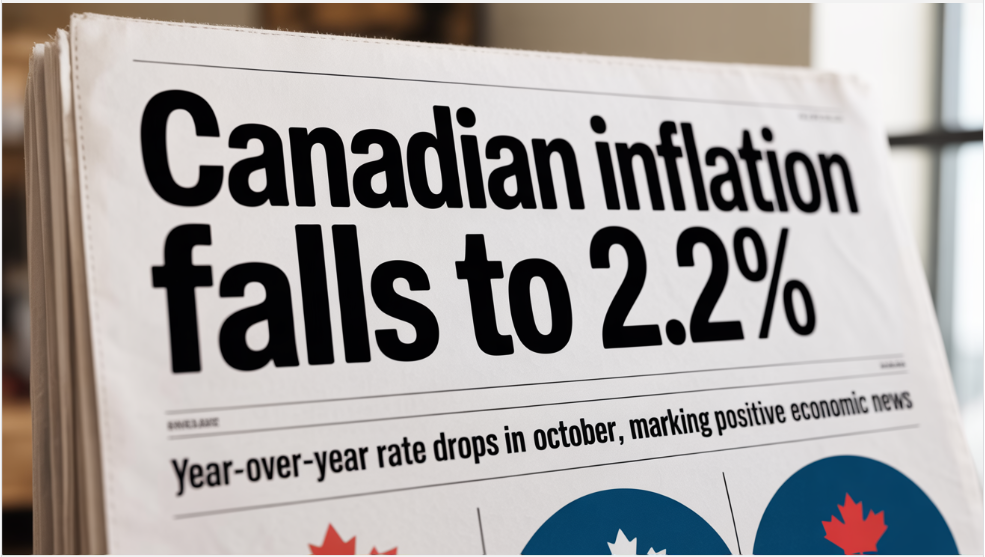
Canadian headline inflation slowed to 2.2% y/y in October, down from 2.4% in September.

The Consumer Price Index (CPI) rose 2.2% on a year-over-year basis in October, down from 2.4% in September. The all-items CPI decelerated largely due to gasoline prices, which fell at a faster year-over-year pace in October (-9.4%) than in September (-4.1%). Excluding gasoline, the CPI rose 2.6% in October, matching the September increase. This was not enough of a decline to move the Bank of Canada off the sidelines, particularly given the recent strength in manufacturing sales, which surged 3.3% in September (estimated at 2.7%). Wholesale trade also surprised to the upside, 0.6% (estimated at 0.0%).
Slower growth in grocery prices further contributed to the CPI’s deceleration in October, which was moderated by surging cellular phone plan prices. Though grocery prices decelerated in October, prices remained elevated and have exceeded overall inflation for nine consecutive months.
Consumers paid more year over year in October for homeowners’ and mortgage insurance (+6.8%) and passenger vehicle insurance premiums (+7.3%). Among the provinces, prices rose the most in Alberta for both measures, with a 13.7% increase in homeowners’ home and mortgage insurance and a 17.8% increase in passenger vehicle insurance premiums.
Since October 2020, homeowners’ insurance and mortgage insurance prices have risen 38.9% nationally, while passenger vehicle insurance prices have risen 18.9%.The index for property taxes and other special charges, priced annually in October, rose 5.6% year over year, down from 6.0% in 2024.
The CPI rose 0.2% month over month in October. On a seasonally adjusted monthly basis, the CPI was up 0.1%.
In October, both the CPI median and the CPI trimmed mean came in cooler than economists had expected. The average of these metrics was 2.95% in October.The old measure of core—prices excluding food and energy—rose 0.3% m/m on an adjusted basis, boosting the yearly rate three full ticks to 2.7% y/y. A pop in cellular services was a significant driver there; in fact, the 7.9% y/y rise in all telephone services was the largest yearly increase since 1982. Still, a pullback in grocery prices, perhaps in part due to the rollback of retaliatory tariffs, helped moderate the Bank of Canada’s core measures. Median prices edged up just 0.1% m/m (s.a.), trimming the annual rate to 2.9%, while trim eased a tick to 3.0% y/y.
Rent perked up again to 5.2% y/y (from 4.8%), and remains the single most significant driver of inflation due to its heavy weight in the index.

Bottom Line
This report does little to change the BoC’s view that underlying inflation remains close to 2-1/2%; but, if anything, most underlying metrics have been stuck a bit above that, or have just crept up there. In other words, this report is just another reason to believe the Bank is moving to the sidelines in December.
Dr. Sherry Cooper -

How Many Credit Cards Should I Have?
When it comes to managing your credit cards, there’s no one-size-fits-all answer. However, many financial experts suggest that maintaining two to three active credit cards is a smart approach, especially when combined with other forms of credit like student loans, auto loans, or mortgages.
But why is that the case? Let’s break it down.
Why Two to Three Credit Cards?
The number of credit cards you have plays a role in your credit score, but it’s not just about quantity. It’s about how well you manage your credit. Typically, having two or three credit cards can help improve your credit mix — a key factor that influences your credit score. When you manage these accounts responsibly, it signals to lenders that you understand how to handle borrowing effectively.
Moreover, the right mix of credit types — including credit cards, loans, and a mortgage — is what most lenders prefer to see. It shows that you can manage different kinds of debt, which is vital when applying for significant loans or mortgages.
How Do Multiple Credit Cards Affect Your Credit Score?
Multiple credit cards can actually help boost your credit score, primarily by lowering your credit utilization ratio. This ratio is the amount of credit you’re using compared to your total available credit. For example, if your total credit limit is $10,000 and you have $2,000 in debt, your credit utilization rate is 20%.
Most experts suggest keeping your utilization below 30%. If you’re above that threshold, it can harm your credit score. By opening a new credit card, you increase your total available credit, which lowers your utilization rate — potentially improving your score.
However, the key here is how well you manage your spending. Ensure that you’re making timely payments and not just paying the minimum balance. This will help you avoid late fees, high-interest rates, and debt accumulation.
The Risks of Having Too Many Cards
While having multiple credit cards can be beneficial, there are risks. It’s easy to fall into the trap of overspending. With each additional card comes a new set of due dates, interest rates, and fees, which can quickly become difficult to manage. This could lead to missed payments and a high credit utilization rate, both of which can negatively impact your credit score.
If you’re considering opening a new card, be sure that you can handle the extra responsibility. Keep track of your spending patterns, set up reminders for payments, and make sure you can meet the monthly obligations without going over your budget.
How Often Should You Apply for a Credit Card?
Applying for too many credit cards in a short period can hurt your credit score. When you apply for a new credit card, the lender performs a hard inquiry on your credit report. Too many hard inquiries within a short time frame can suggest to lenders that you’re overextending yourself and taking on too much debt, which could lower your credit score.
Therefore, only apply for a new credit card when it fits into your overall financial plan and you’re confident that it will be manageable.
When Is It Too Much?
While having two or three credit cards is typically recommended, some people might handle more without issue, especially if they have a clear strategy in place. However, for many people, more than three credit cards can become overwhelming and harder to manage.
The most important thing to remember is not how many cards you have, but how responsibly you use them.
Key Tips for Managing Multiple Credit Cards
- Monitor Your Balances: Keep track of how much you owe on each card. This will help you avoid missing payments or exceeding your credit limit.
- Pay On Time: Late payments can result in fees and damage your credit score. Set up automatic payments or reminders to make sure you’re never late.
- Pay in Full When Possible: Paying off your balance in full each month is the best way to avoid paying interest and to maintain a good credit score.
- Check Your Credit Report Regularly: Understand what lenders see when they pull your credit report. This gives you a better idea of how to improve your score.
What About Your Mortgage?
Managing your credit cards wisely is important, especially when you’re planning for larger financial goals like buying a home. Whether you’re a first-time buyer or looking to refinance, understanding your credit score is essential. The right financial tools can make all the difference in securing a mortgage that works for you.
For those of us facing rising living costs or looking for ways to maximize our home equity, reverse mortgages can offer financial relief. If you’re 55 or older, this may be an option worth exploring. A reverse mortgage can provide the financial cushion you need, allowing you to stay in your home while tapping into its equity.
Want to know more?
Reverse mortgages: 55+? A cushion against the rising cost of livingWhen it comes to managing your finances, it’s important to stay on top of your credit card usage. If you’re ready to take the next step in your financial journey, remember that MorningLee.ca is here to help with a range of mortgage and loan services designed to fit your needs.

-
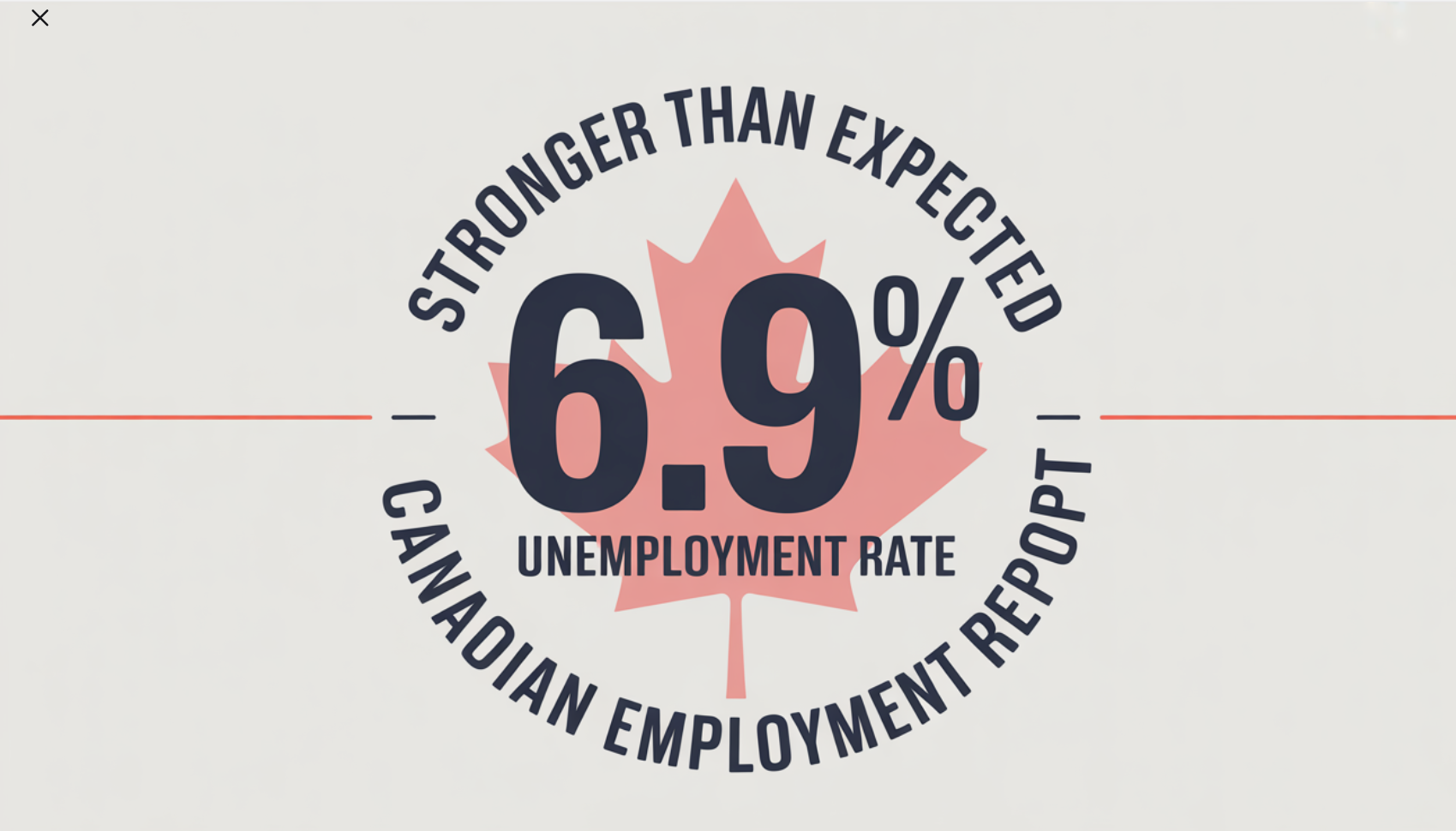
December BoC Rate Cut? October Labour Force Survey Much Stronger Than Expected

Labour Force Survey for October showed a stronger-than-expected net employment gain of 66,600, on the heels of September’s upside surprise. Cumulative gains in September and October (+127,000; +0.6%) have offset cumulative declines observed in July and August (-106,000; -0.5%).
Even more unexpected was the dip in the jobless rate from 7.1% in August and September to 6.9% last month. The Bank of Canada had already suggested that the overnight policy rate, at 2.25%, was low enough to spur growth and mute inflation.
The employment rate rose to 60.8%. The employment rate in October was unchanged year over year but remained below the recent high of 61.1% recorded in January and February 2025.
There were more people working in wholesale and retail trade (+41,000; +1.4%), transportation and warehousing (+30,000; +2.8%), information, culture, and recreation (+25,000; +3.0%), and utilities (+7,600; +4.6%). On the other hand, employment in construction declined by 15,000 (-0.9%).
Employment increased in Ontario (+55,000; +0.7%) and in Newfoundland and Labrador (+4,400; +1.8%), while it declined in Nova Scotia (-4,400; -0.8%) and Manitoba (-4,000; -0.5%).
Average hourly wages among employees increased 3.5% (+$1.27 to $37.06) on a year-over-year basis in October, following growth of 3.3% in September (not seasonally adjusted).
The employment increase in October was driven by part-time work (+85,000; +2.3%). This follows an increase in full-time work in September (+106,000; +0.6%). On a year-over-year basis, employment was up in both full-time work (+199,000; +1.2%) and part-time work (+101,000; +2.7%).
Private sector employment rose by 73,000 (+0.5%) in October, the first increase since June. There was little change in the number of public sector employees or self-employed workers in October.
Despite the employment increase in October, total actual hours edged down (-0.2%) in the month as an elevated number of employees lost work hours due to labour disputes occurring during the Labour Force Survey reference week (October 12 to 18).
An estimated 87,000 employees across the provinces lost work hours due to labour disputes during this period (not seasonally adjusted). This was particularly notable in Alberta, where a teachers’ strike and a subsequent lock-out led to the closure of most elementary and secondary schools in the province.
On a year-over-year basis, total actual hours were up 0.7% in October.

Even with the latest jobs report, the Canadian economy remains vulnerable to the unsettling US attitude towards the free trade agreement, which is slated to be renegotiated by July 2026. But Governor Tiff Macklem has said that fiscal stimulus would be more effective than monetary stimulus in response to tariff-generated weakness. Judging from this week’s federal budget 2025 announcements, fiscal stimulus will take considerable time to impact the overall economy.
The unemployment rate fell 0.2 percentage points to 6.9% in October. Prior to this decline, the unemployment rate had reached 7.1% in August and September, the highest level since May 2016 (excluding 2020 and 2021 during the COVID-19 pandemic).
Nearly one in five (19.8%) unemployed people in September had found work in October. This proportion (referred to as the job finding rate) was up from 12 months earlier (16.5%) but was lower than the average for the same months from 2017 to 2019 (24.6%) (not seasonally adjusted).

Bottom Line
The Bank of Canada has made it clear that it will focus on inflation and will leave closing the output gap to fiscal policy. By early next year, it will be clear to the Bank of Canada that fiscal stimulus in the form of significant capital spending projects is just too slow. I expect the Bank of Canada to take the overnight rate down to 2.0% in early 2026.Dr. Sherry Cooper
-
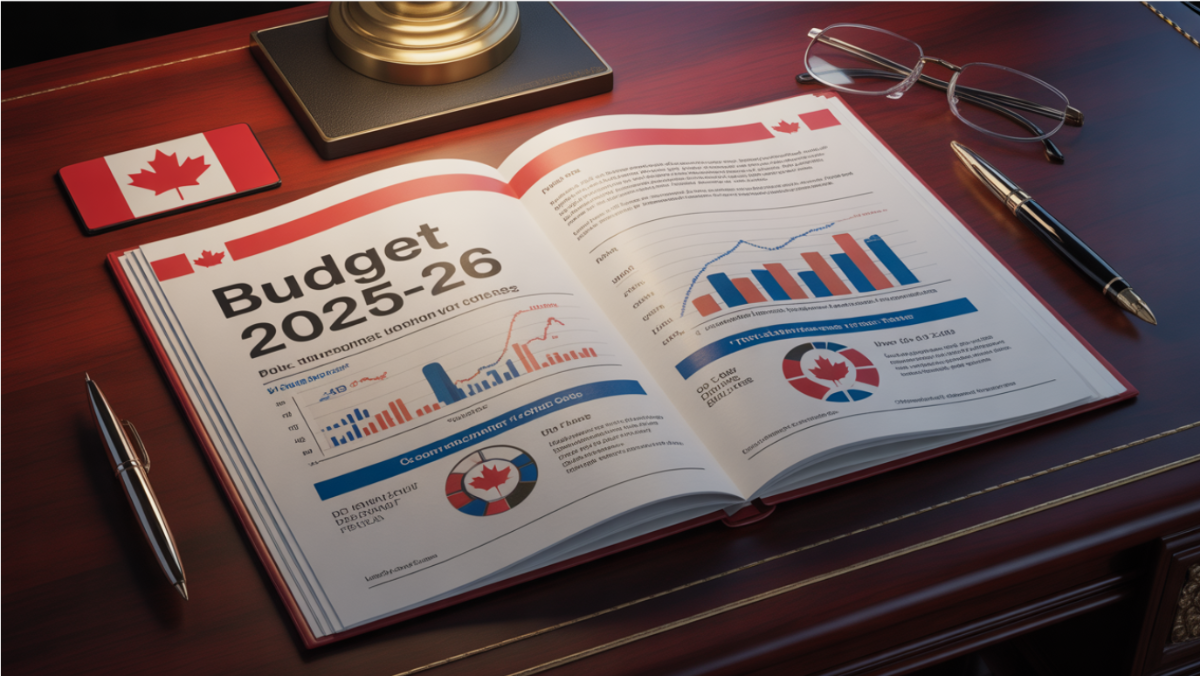
Federal Budget Revamp, FY 2025-2026
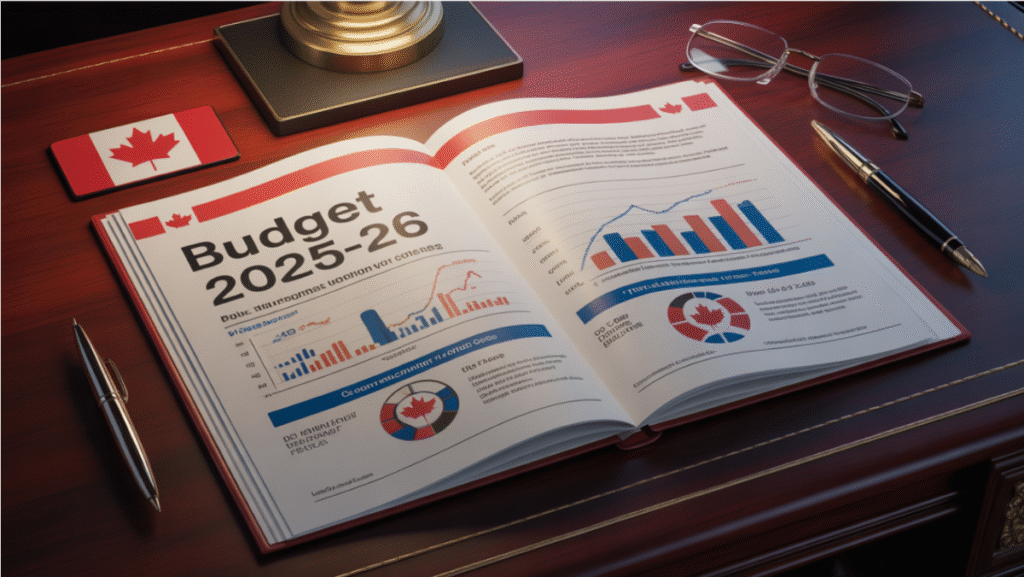
Today, Finance Minister François-Philippe Champagne presented his first budget. Mark Carney was elected Prime Minister with a mandate to transform Canada’s economy and reduce its dependence on trade with the United States. The Carney government’s inaugural budget emphasizes structural changes to strengthen the domestic economy and boost non-U.S. exports, and it will be funded by an increase in government debt.
Carney, a former central banker who took office in March, has committed to decreasing reliance on the U.S. by increasing military spending, accelerating infrastructure projects, speeding up housing construction, and enhancing business competitiveness. Given the current large deficits and a rising debt-to-GDP ratio, the government cannot afford higher long-term interest rates. Carney has promised to build a stronger Canada using domestic resources and labour, noting that only 40% of the steel used in Canada is produced domestically, and he intends to change that.
Champagne has cautioned that the public service will need to shrink as the government strives to balance the budget in the coming years. Carney also faces a political challenge in convincing some opposition members to support his budget or at least abstain from voting against it. His Liberal Party caucus is currently three seats short of a majority in the House of Commons, meaning it cannot pass the budget on its own.
Unemployment remains high, economic growth is weak, and exporters, along with business investment, are still struggling due to U.S. tariffs. Carney and Champagne must persuade citizens that jobs, real wages, and living standards will eventually improve if they can stimulate both domestic and foreign investment.
Last week, the Bank of Canada indicated that it is nearing the limit of monetary stimulus it can provide without triggering inflation. Governor Tiff Macklem has consistently stated that he sees fiscal policy as a more effective tool to counter the adverse effects of the trade war, which he perceives as a negative supply shock.
The chart above indicates that Canada not only had the lowest deficit-to-GDP ratio in the G-7 but also among all countries with a triple-A credit rating. However, the rate at which we are issuing net new debt is expected to accelerate over the next year or two. Canada needs to assure the bond market that we will maintain our triple-A credit rating to keep financing costs manageable.
Ottawa has divided the budget into two parts: the operating budget and the capital spending budget. The operating budget covers the costs of running the federal government, which includes salaries, wages, rent, and interest payments on the debt. Carney has urged government leaders to review their operating budgets and eliminate unnecessary costs, which include downsizing the federal workforce.
A similar approach is used in countries like the United Kingdom and New Zealand, as well as by some provinces here at home. In principle, this shift could enhance transparency by allowing a better understanding of how public funds are allocated between day‑to‑day program spending and long‑term investments intended to boost future growth.
The capital spending budget is more complex because it’s harder to determine which expenditures will enhance growth and productivity. For instance, while the government is increasing defence spending to meet our NATO obligations, not all of it will contribute to productivity growth.
Ottawa’s agenda highlights major infrastructure projects, defence initiatives, housing, significant undertakings like pipelines, enhanced ports, and the development of the Ring of Fire. Federal leadership believes there is a role for industrial policy, as well as measures aimed at broad deregulation and tax competitiveness.

This year’s federal budget projects a deficit of $78.3 billion—nearly double the Liberals’ projection a year ago—prioritizing capital project spending over services. The deficit is expected to decrease gradually to $56.6 billion by 2029-30. Only a year ago, the Liberals forecast a 2025 budget deficit of $42.2 billion, but that was before trade uncertainty and tariff inflation hit our shores with the inauguration of Donald Trump last January.
The budget presents both downside and upside scenarios. In the downside scenario, ongoing trade uncertainty could worsen the budgetary balance by $9.2 billion annually, while the upside scenario anticipates a $5 billion annual improvement contingent on easing trade uncertainties.
Finance Minister François-Philippe Champagne emphasized the need for “generational” investments, allocating $25 billion to housing, $30 billion to defence, and $115 billion to infrastructure over the next five years. He criticized proposals to cap the deficit at $42 billion, advocating instead for investments to drive future growth.
The 2025 budget introduces a new format that separates capital and operational spending, with capital investments accounting for 58% of this year’s combined deficit. This shift aims to catalyze $500 billion in private-sector investment. However, we should be skeptical that such animal spirits will materialize quickly, given the immense uncertainty about the future of the Canada-Mexico-US free trade agreement.
The budget pledges to balance operational spending in three years.
Ottawa has been running a “comprehensive expenditure review” to spend less on the day-to-day operations of the federal government. According to the budget, that plan will save $13 billion annually by 2028-29, for a total of $60 billion in savings and revenues over five years.
The budget promises more taxpayer dollars will go toward “nation-building infrastructure, clean energy, innovation, productivity and less on day-to-day operating spending.” This “new discipline” will help protect social benefits, the budget promises.
The public service will see a drop of about 40,000 positions over the coming years. The budget projects it will have 330,000 employees in 2028-29, down from the 368,000 counted last year.
To confront an anemic economic picture, the government says it’s “supercharging growth” and vows to “make Canada’s investment environment more competitive than the U.S.”
To that end, the budget introduces a “productivity super-deduction” tax measure that will allow companies to write off a larger share of capital investments more quickly.
There are also new measures specifically for writing off expenses for manufacturing or processing buildings, as well as a new capital cost allowance for liquefied natural gas (LNG) equipment and related buildings.
Build Baby Build
Fast-tracking nation-building projects: In close partnership with provinces, territories, Indigenous Peoples, and private investors, the government is streamlining regulatory approvals and helping to structure financing.Additional Cuts to Immigration
Selling it as Ottawa “taking back control” over an immigration system that has put pressure on Canada’s housing supply and health-care system, budget 2025 promises to lower admission targets.The new plan proposes to drastically reduce the target for new temporary resident admissions from 673,650 in 2025 to 385,000 in 2026.
The 2026-28 immigration levels plan would keep permanent resident admission targets at 380,000 per year, down from 395,000 in 2025.
Ending Some High-End Taxes
The government is also proposing to undertake a one-time measure to accelerate the transition of up to 33,000 work permit holders to permanent residency in 2026 and 2027.“These workers have established strong roots in their communities, are paying taxes and are helping to build the strong economy Canada needs,” the budget notes.
To fill labour gaps, the Liberals’ plan includes a foreign credential recognition action fund to work with the provinces and territories to improve transparency, timeliness and consistency of foreign credential recognition.
It would also launch a strategy to attract international talent, including a one-time initiative to recruit over 1,000 highly qualified international researchers to Canada.
In addition, there were billions of dollars in increased defence spending, the details of which are still sketchy.




Bottom Line
Nothing in this budget is surprising, as most of it has been telegraphed in recent weeks. The budget asserts that “the global trade landscape is changing rapidly, as the United States reshapes its economic relationships and supply chains around the world. The impact is profound—hurting Canadian companies, displacing workers, disrupting supply chains, and creating uncertainty that holds back investment. This level of uncertainty is greater than what we have seen in recent crises. Budget 2025 makes generational investments while maintaining Canada’s strong fiscal advantage—a foundation that allows us to invest ambitiously and responsibly, and build Canada’s economy to be the strongest in the G-7.”
Canada has the lowest net debt-to-GDP ratio among the G-7 and one of the smallest deficit-to-GDP ratios. Canada and Germany are the only two G-7 economies rated triple-A, a marker of strong investor confidence which helps keep our borrowing costs as low as possible. This is a time for bold actions to bolster Canada’s competitiveness. We have products the world needs. Hopefully, we can salvage a significant part of the trade agreement with the US, but the odds suggest we build the infrastructure necessary to trade our products worldwide.
Dr. Sherry Cooper
-
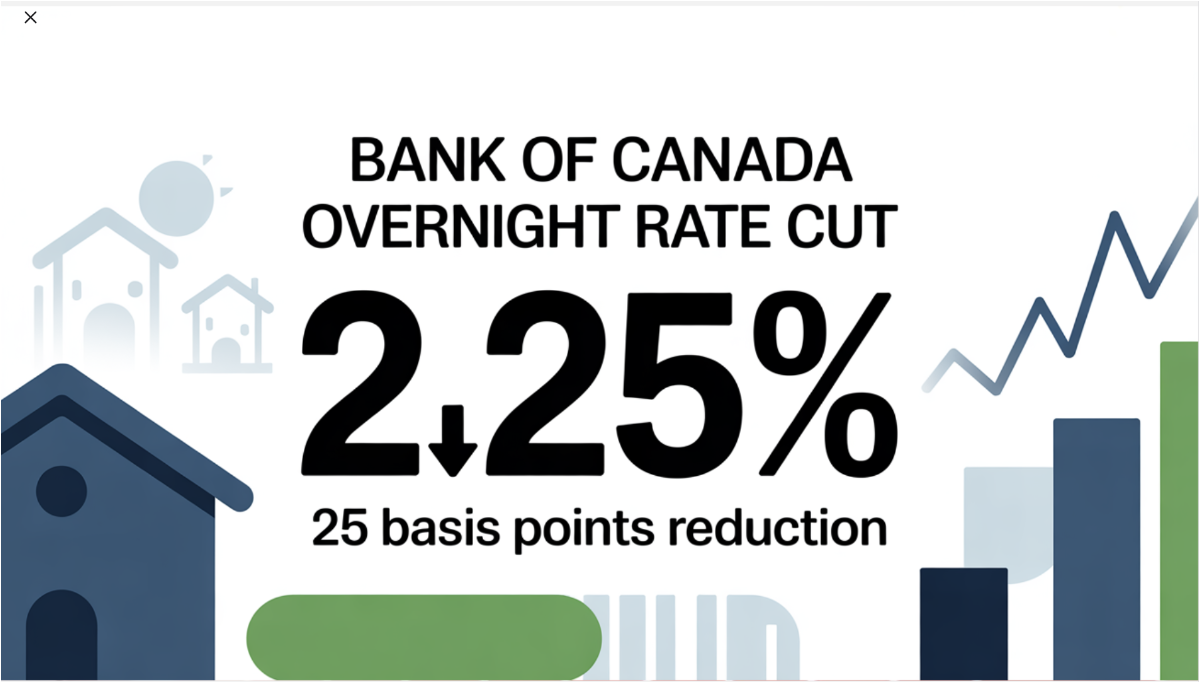
Bank of Canada Lowers Policy Rate to 2.25%
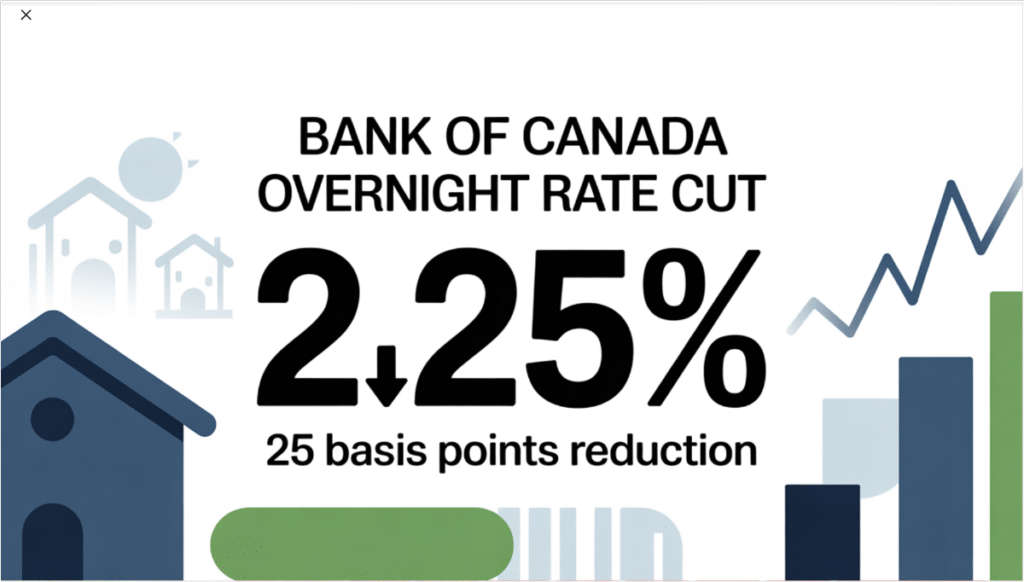
Today, the Bank of Canada lowered the overnight policy rate by 25 bps to 2.25% as was widely expected. This is the bottom of the Bank’s estimate of the neutral overnight rate, where monetary policy is neither expansionary nor contractionary. The economy will grow at about a 0.5% pace in Q3, causing the Bank to cut rates again at the final meeting this year on December 10. The easing will then end, but rates will remain relatively subdued until more trade uncertainty is alleviated.
The Fed is widely expected to cut rates by 25 bps this afternoon as well.
Today’s Monetary Policy Report suggests that the significant decline in export growth will persist for some time. Layoffs in trade-dependent sectors have already slowed considerably, especially in Ontario, Quebec, and some softwood lumber businesses in several provinces. The central bank acknowledged that “because US trade policy remains unpredictable and uncertainty is still higher than usual, this projection is subject to a wider-than-normal range of risks.”
“In the United States, economic activity has been strong, supported by the boom in AI investment. At the same time, employment growth has slowed and tariffs have started to push up consumer prices. Growth in the euro area is decelerating due to weaker exports and slowing domestic demand. In China, lower exports to the United States have been offset by higher exports to other countries, but business investment has weakened. Global financial conditions have eased further since July and oil prices have been fairly stable. The Canadian dollar has depreciated slightly against the US dollar.”
“Canada’s economy contracted by 1.6% in the second quarter, reflecting a drop in exports and weak business investment amid heightened uncertainty. Meanwhile, household spending grew at a healthy pace. US trade actions and related uncertainty are having severe effects on targeted sectors, including autos, steel, aluminum, and lumber. As a result, GDP growth is expected to be weak in the second half of the year. Growth will get some support from rising consumer and government spending and residential investment, and then pick up gradually as exports and business investment begin to recover.”
Canada’s labour market remains soft, and job vacancies have declined sharply despite the September improvement in job growth. Job losses continue to mount in trade-impacted sectors, and hiring has been weak across the economy. The unemployment rate remained at 7.1%, well above the US rate of 4.3%. Slower population growth translates into fewer new jobs and less inflation pressure. On a per capita basis, the economy is already in a recession.

The Bank projects GDP will grow by 1.2% in 2025, 1.1% in 2026 and 1.6% in 2027. Quarterly, growth strengthens in 2026 after a weak second half of this year. Excess capacity in the economy is expected to persist and be gradually absorbed.
“CPI inflation was 2.4% in September, slightly higher than the Bank had anticipated. Inflation excluding taxes was 2.9%. The Bank’s preferred measures of core inflation have been sticky around 3%. Expanding the range of indicators to include alternative measures of core inflation and the distribution of price changes among CPI components suggests underlying inflation remains around 2.5%. The Bank expects inflationary pressures to ease in the months ahead and CPI inflation to remain near 2% over the projection horizon”.
“If inflation and economic activity evolve broadly in line with the October projection, the Governing Council sees the current policy rate at about the right level to keep inflation close to 2% while helping the economy through this period of structural adjustment. If the outlook changes, we are prepared to respond. Governing Council will be assessing incoming data carefully relative to the Bank’s forecast.”
Bottom Line
The Bank of Canada has shown its willingness to bolster the Canadian economy amid unprecedented trade uncertainty. While Canada is working hard to establish alternate trade partners, even China cannot replace the US in terms of proximity and cost-effectiveness, given the huge transport costs. China has stepped up its oil purchases to record levels, but larger oil flows east will require additional pipelines to BC. There is no market the size of the US market to replace exports of steel and aluminum. The US will also suffer from the economic impact of stepping away from the Canada-US-Mexico free trade deal. A renegotiation of the contract is likely to come before the end of next year. As of now, the US is signalling their desire to exit the agreement. We can only hope that cooler heads will prevail.
The auto industry is a case in point. Onshoring non-US auto production would require a 75% increase in US production and the construction of $50 billion in new factories. This would take years and significantly reduce the profitability of US auto companies.
Canada is the US’s number one supplier of steel and aluminum, with its competitively low hydroelectric costs. It will take time for the US to create the capacity to replace aluminum imports from Quebec.
Canada is the number one trading partner for 32 American states, many of which are lobbying Washington to end this CUSMA bashing.
It will take time for Canada to adjust to this new reality, which leads us to conclude that another cut in overnight rates is probable at the next decision date on December 10.

Dr. Sherry Cooper